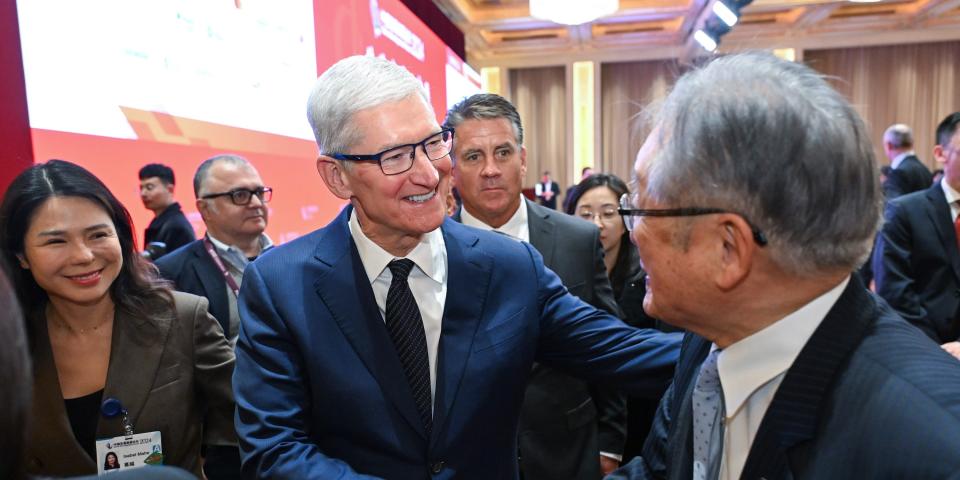The US-China rivalry will reshape the landscape for Big Tech earnings

The growth of US tech earnings is vulnerable to ongoing tensions with China.
As Beijing exerts influence in the region, US tech firms will compete for a smaller market share.
Decoupling from China is underway, but it's likely to be a long process, sources say.
US tech giants have mostly wrapped up earnings, and their performance shows a clear message: It's impossible to ignore the impact of China on financial results.
Tesla felt the chill of slowing demand in China as sales tumbled by 4% in the first quarter. Meanwhile, Apple saw 18% of its sales come from China, underscoring the pivotal role the country plays in its earnings strength.
S&P Global data shows that for US chip firms, China is even more important for business than their home turf.
Investors have become more alert to China's hand in powering the earnings of some of the biggest US tech companies and, consequently, their stock prices, with experts forecasting that the rivalry between the two superpowers to reshape the US tech landscape going forward.
Geopolitical tensions
Abishur Prakash, the founder of advisory firm The Geopolitical Business, told Business Insider that US tech companies ignoring the geopolitical tensions with China are risking serious setbacks to their portfolios.
"The train has left the station when it comes to rethinking China," he said. "It is becoming clear that on a long enough timeline, everybody will have to pick sides."
Regarding Tesla's earnings, Prakash said Elon Musk's electric vehicle company could've seen better results if it had considered geopolitical realities more.
"Tesla thought it could build in China, and then export Chinese-made cars to the world. But now from India to Europe, many do not want Chinese-made EVs," he said.
"Large tech firms built their base in China at a time when the geopolitical climate was very different. Today, however, being in China or exporting from China puts companies in the 'geopolitical crosshairs,'" he added.
The division could be exacerbated by the macro headwinds facing China's economy. Besides a struggling property sector and low consumer spending, analysts highlight China's depreciating currency as a major economic challenge.
Kelvin Wong, senior market analyst at Oanda, told BI the devaluation of the Chinese yuan to boost export growth amid weak domestic demand is likely to depreciate currencies of other key exporters like South Korea, Taiwan, and even Japan.
"These countries are considered 'friendlier nations' in the US onshoring/decoupling strategic plan which in turn may trigger a negative feedback loop into the share prices of the US mega-cap tech firms," he said.
"2 tech stack divide"
In the booming artificial intelligence space, experts said the US and China's "tit for tat" restrictions on key technologies would gradually produce ripple effects for US tech firms.
"Our view is that we are rapidly approaching what we call a '2 tech stack divide,' where in essence, each country, the US and China, are effectively walling off or ring-fencing their tech stacks from each other," Jay Pelosky, the founder of TPW Advisory, told BI.
According to Pelosky, despite the US ramping up sanctions on China in the tech space, Beijing could eventually exert influence in Southeast Asia, where countries like Vietnam, Malaysia, and Indonesia will increasingly come under the influence of China's tech dominance due to Chinese companies' cheaper prices and larger scale compared to their American counterparts.
"The US tech companies are going to find themselves basically competing for a smaller share of the global growth pie, because Southeast Asia is the fastest growing region in the world," he said.
Decoupling in progress
Prakash said that unlike the past, US tech companies now have a new strategy: "Keeping the US happy, maintaining business in China, and looking for new markets to offset a 'China loss.'"
"Just look at how Nvidia and AMD are building custom chips just for the Chinese market to comply with sanctions," he said.
Nvidia has yet to report earnings, but expectations are high. Yet, Prakash said the chip maker faces a "complex situation" in China.
"On the one hand, the US government is constantly closing door after door to what Nvidia can sell to China. On the other hand, China is using official and unofficial channels to scoop up Nvidia chips," he said.
Experts believe that China will gradually contribute less to the revenue of mega-cap US tech firms.
"Going forward, it seems that the US-China high-tech war is still ongoing, where friendly onshoring and decoupling of technology-related supply chains have been gaining traction post-COVID," said Wong.
Read the original article on Business Insider

 Yahoo Finance
Yahoo Finance 